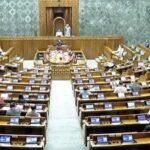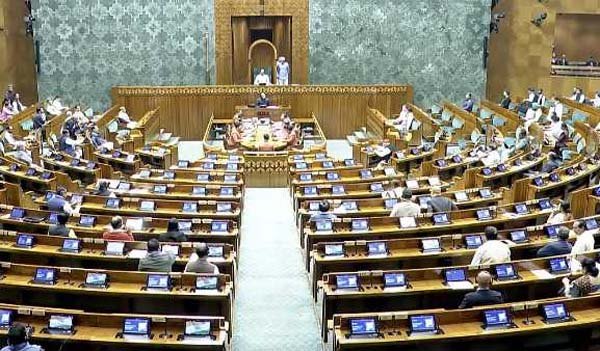New Delhi, Sept 14 (UNI) On the occasion of Hindi Diwas today, union Home Minister Amit Shah extended warm greetings to the nation and emphasised the central role Indian languages play in preserving the country’s rich cultural, historical and spiritual heritage.
In a message marking the day, Shah described India as “fundamentally a language-oriented nation”, a Home Ministry statement said.
“Our languages have been a powerful medium for carrying forward culture, history, traditions, knowledge, science, philosophy, and spirituality from generation to generation. From the heights of the Himalayas to the vast beaches of the South, from the desert to the rugged forests and village chaupalas, languages have shown the way to man in every situation to stay organized and move forward unitedly through communication and expression,” he said.
“Walk together, think together, and speak together has been the core mantra of our linguistic-cultural consciousness,” Shah said.
Shah said, “The greatest strength of India’s languages is that they have provided every class and community with an opportunity for expression”.
He highlighted how regional languages and folk traditions such as Bihu songs in the Northeast, Oviyalu from Tamil Nadu, the songs of Lohri in Punjab, the verses of Vidyapati in Bihar, the hymns of Baul saints in Bengal, Kajri songs, and Bhikari Thakur’s ‘Bidesia’ have all contributed to keeping Indian culture vibrant and welfare-oriented.
Shah praised the way Indian languages, despite their diversity, have moved forward in unity, transcending geography and community.
“I firmly believe that languages, by becoming companions of one another and bound in the thread of unity, are moving forward together. Saint Thiruvalluvar is sung with as much devotion in the South as he is read with interest in the North.
Krishnadevaraya was as popular in the South as he was in the North. The patriotic compositions of Subramania Bharati ignite national pride in the youth of every region. Goswami Tulsidas is revered by every Indian, and the couplets of Saint Kabir are found in translations in Tamil, Kannada, and Malayalam.
Surdas’s poetry remains prevalent in the temples and musical traditions of South India even today. Srimanta Sankardeva and Mahapurush Madhavdeva are known to every Vaishnav, and Bhupen Hazarika’s songs are hummed even by the youth of Haryana, he said.
Shah underlined the role of Indian languages in the freedom movement, noting how they became voices of resistance during colonial rule. He cited the slogans “Vande Mataram” and “Jai Hind” as powerful symbols that emerged from India’s linguistic soul and fueled the fire of patriotism across the country.
Shah said, “Even during the difficult period of slavery, Indian languages became the voice of resistance. Our languages played a significant role in making the freedom movement a nationwide endeavor. Our freedom fighters connected the languages of the regions and villages with the freedom struggle.”
Along with Hindi, poets, litterateurs, and playwrights of all Indian languages strengthened the resolve for independence among every age group, class, and community through folk languages, folktales, folk songs, and folk plays. Slogans like ‘Vande Mataram’ and ‘Jai Hind’ emerged from our linguistic consciousness and became symbols of pride for independent India, Shah said.
The Home Minister also reflected on the adoption of Hindi in Devanagari script as the official language on September 14, 1949, and referenced Article 351 of the Constitution, which encourages the promotion of Hindi as a means of India’s composite culture.
“Article 351 of the Constitution assigns the responsibility of promoting and spreading Hindi to make it an effective medium of India’s composite culture,” Shah stressed.
Praising the efforts made over the past decade, he said, “under the leadership of Prime Minister Narendra Modi Ji, a golden era of renaissance for Indian languages and culture has emerged”.
He applauded the Prime Minister for using Hindi and other regional languages on global platforms like the United Nations, G20, and SCO, raising the pride and recognition of Indian linguistic heritage worldwide.
he said that in the ‘Amrit Kaal’ of independence, the PM hds taken the ‘Panch Pran’ (five pledges) to free the country from the symbols of slavery, in which languages have a significant role.
“We must adopt Indian languages as the medium of communication and interaction,” he added.
Hailing the official language Hindi of completing 76 glorious years, Shah said, “The Department of Official Language, having completed 50 golden years of its establishment, has done remarkable work in making Hindi the language of the masses and public consciousness”.
Stating that since 2014, the use of Hindi in government work has been continuously promoted, Shah said, In 2024, on Hindi Diwas, the Bharatiya Bhasha Anubhag was established with the aim of ensuring seamless translation between all major Indian languages”.
He emphasised that the government’s goal is to ensure Hindi and other Indian languages become not just a medium of communication but the cornerstone of technology, science, justice, education, and administration.
“In this era of Digital India, e-Governance, Artificial Intelligence and Machine Learning, we are developing Indian languages as future capable, relevant and a driving force in making India a leader in global technological competition,” he added.
“Language is like a drop of monsoon that washes away sorrow and infuses life with renewed energy,” he said, emphasising the emotional and cultural power of language from childhood stories to ancient scriptures.
Quoting the famous Mithila poet Vidyapati, Shah said: “Desil bayana sab jan mittha” means, one’s own language is the sweetest”.
He called upon citizens to respect all Indian languages, including Hindi, and to work together toward building a self-reliant, self-confident, and developed India.











